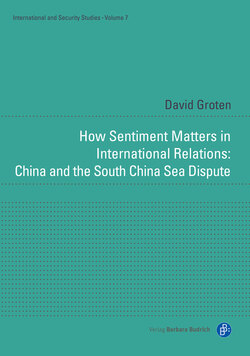Читать книгу How Sentiment Matters in International Relations: China and the South China Sea Dispute - David Groten - Страница 25
На сайте Литреса книга снята с продажи.
[51] 2.3.1 Reference Points and Respect Indicators
ОглавлениеGiven the subjective character of respect perception, its discursive identification cannot be executed solely by means of universal criteria. Instead, an additional brief look at some country-specific criteria is necessary. Against this backdrop, the domestic significance criterion (Wolf, 2011) represents an appropriate starting point. As established previously, respect and face are traditionally rooted in Chinese (and Asian) culture and history. In the words of Nathan & Scobell, “Chinese tradition emphasizes the importance of giving and getting ‘face’, or favourable personal recognition. Face has long been a central consideration in interpersonal relations in China” (2012, p. 25). In recent years, Chinese philosophy and Confucian thought have increasingly developed into key pillars and concepts of official Chinese historiography, thereby shaping China’s identity conceptions (Chen, 2005; Feng, 2007; Zhang, 2015c). At the same time, aside from its Confucian origin, China’s political system is assumed to be somewhat conducive to respect dynamics. According to Bakr. et al., respect is more likely to matter in countries governed by “authoritarian elites with a fragile popular legitimacy” (2003, as cited in Wolf, 2008, p. 29; cf. Heller, 2013). Overall, the PRC clearly appears to meet the domestic significance criterion69. In addition, identity stability (Wolf, 2011) is another crucial reference point. Accordingly, several scholars point to the existence of a Chinese national identity crisis in recent years (chapter 4.1). In this vein, Yan stresses, “China is not prepared for world leadership. When the world asks China: what do you want to be? It doesn’t know, and that’s the problem“ (Yan, 2012, as cited in Shambaugh, 2013, p. 13). Hence, the criterion of identity stability or fragility can also be considered to be met. Furthermore, as respect dynamics are said to be particularly eminent in conflict-prone and unstable environments, the general nature and setting of the SCS dispute as well as its overall significance to the PRC are noteworthy, too. This assessment is underscored by Roy who contends that ”China’s perception of whether its external environment is accommodating versus threatening, and offers opportunities versus dangers, will shape PRC foreign policy“ (2013, p. 2). [52] Accordingly, the SCS region’s fragile, unstable and conflict-prone order, its conflictual history, the highly sensitive issues at stake (national sovereignty, territorial integrity, etc.) all suggest that respect dynamics are indeed playing a vital role in Southeast Asia, a region in which conflicting norms, values and political systems are clashing with one another.
Building upon these reference points suggesting a general significance of respect in Chinese FPTT discourses on the SCS, the disrespect identification process has to be discussed in detail. Drawing upon constructivist logic, disrespect, while frequently not articulated in a literal and direct manner, is assumed to be reflected in performative acts, particularly speech acts and discourses (Austin, 1962) but also signs, gestures and concrete conduct. Accordingly, for the sake of identification, this project applies six theory-guided indicators70:
(1) literal usage and direct reference to respect and related concepts,
(2) references to status & social importance,
(3) references to rights & interests,
(4) references to dominant Chinese national identity narratives,
(5) emotional critique of external conduct (the question of adequacy),
(6) reliance on minor issues (e.g. rights) regardless of disproportionate costs involved.
Those respect indicators and the major reasons as to why states tend to respond to disrespect by means of confrontation call for a brief introduction.
